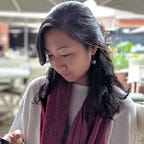Year of Discovery (Week 46: Paradox and War)
This last week, Chicago experienced peaceful snowfalls, which covered the city with a soft white powder and turned branches into icicles. I felt a mix of enjoyment with my days spent learning and nostalgia knowing my time here is coming to an end. Those emotions mixed with an increasing confusion in the irrationality of global events and with an understanading of the everchanging nature of the world.
Today’s reflection focuses on paradox and war.
Self (on Paradox)
Brene Brown: “Carl Jung wrote, ‘Only the paradox comes anywhere near to comprehending the fullness of life.’ We are complex beings who wake up every day and fight against being labeled and diminished with stereotypes and characterizations that don’t reflect our fullness.”
Tao Te Ching:
When people see some things as beautiful,
other things become ugly.
When people see some things as good,
other things become bad.Being and non-being create each other.
Difficult and easy support each other.
Long and short define each other.
High and low depend on each other.
Before and after follow each other.Therefore the Master
acts without doing anything
and teaches without saying anything.
Things arise and she lets them come;
things disappear and she lets them go.
She has but doesn’t possess,
acts but doesn’t expect.
When her work is done, she forgets it.
That is why it lasts forever.
George Eliot (Middlemarch): “But I have a belief of my own, and it comforts me…That by desiring what is perfectly good, even when we don’t quite know what it is and cannot do what we would, we are part of the divine power against evil — widening the skirts of light and making the struggle with darkness narrower.”
The World (on War)
Russia attacks Ukraine this week to claim what they believe is rightfully theirs and it has taken some by surprise. It may become the largest European conflict in decades and every country is observing carefully how other countries respond.
The Syrian Civil War (unrest which began on 15 March 2011) continues in its 11th year. Estimates of the total number of deaths by opposition activist groups, vary between 494,438 and about 606,000 as of June 2021.
Japan’s prime minister, Kishida Fumio, implied that the aggression of Russia’s Putin towards Ukraine could embolden his Chinese counterpart, Xi Jinping, regarding Taiwan.
Ideas to Action
This week I had a fascinating conversation with a physicist. He was trying to apply the ‘hard science’ and rigor of physics to social science and ethics, arguing that we all just need rules to live and make decisions by in order to decrease the divide between ideologies. My response was that in hard sciences, Galileo’s belief that “most times real simplicity lies behind apparent complexity” holds, but with human beings, apparent simplicity usually conceals underlying complexity (says Gary Moron and Morton Schapiro in their book). The paradoxes and complexity within each of us manifests in what we perceive to be irrationality and many ‘rational’ thinkers may perceive world events like war to be irrational. War is led by human beings and the simplicity we sometimes paint often conceals a complexity we often don’t understand.
During Russia’s attack on Ukraine this week, world leaders watch on with fear of inciting another global war, showing support and solidarity in words but not in action. For me as I continue to watch the updates, I’m sitting in the discomfort of acknowledging the complexities that I don’t understand and feeling compassion and hope for people within the war to find peace within it all. The paradox of action and inaction sits within each of us everyday and the discomfort of not knowing which to take on is universal.
Within any event, there are always multiple truths and rather than condemning one or another, I’m trying to spend time thinking to myself from multiple perspectives why something like the Ukraine-Russisa war would happen. Going a couple layers down and attempting to take on other viewpoints (in the learning zone) may yield more insights on humanity and what leads to greater scale suffering.
Those who can become aware of, acknowledge and hold space for the multiple paradoxes within us can harness compassion that arises from this wisdom and make decisions that bring more peace to the world.
What I’m Listening to This Week: Love Your Enemies? (Really?)
